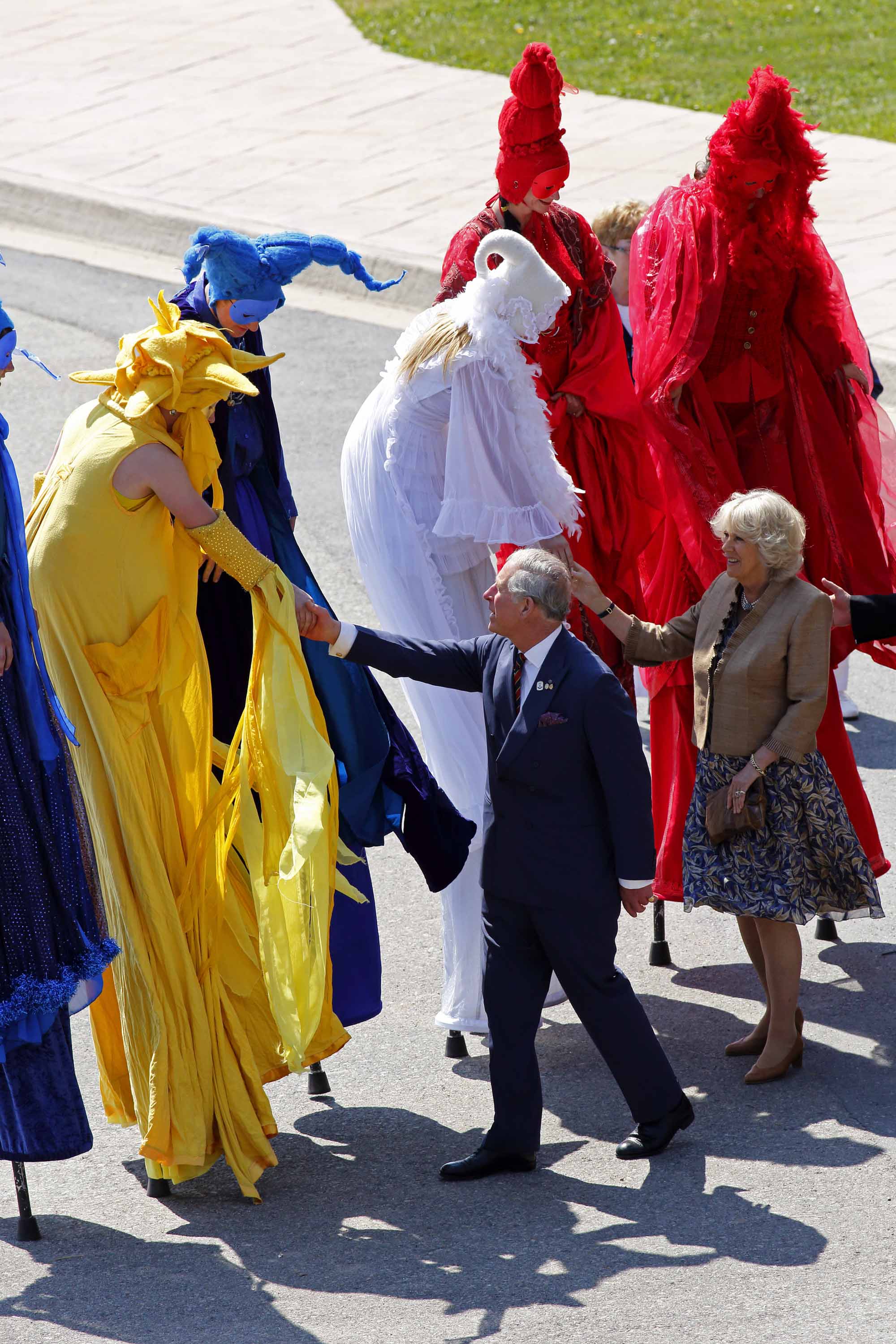Camilla, Queen Consort, formerly HRH Duchess of Cornwall (born 17 July 1947 in London, United Kingdom), is the queen consort and second wife of King Charles III, King of the United Kingdom, Canada and 14 other Commonwealth Realms. She undertook five official tours of Canada with the then Prince of Wales, including celebrations for the 150th anniversary of Confederation in 2017 and Queen Elizabeth II’s Platinum Jubilee in 2022. In 2025, she visited Canada for the first time as the Queen, accompanying King Charles III to the opening of Parliament in Ottawa.
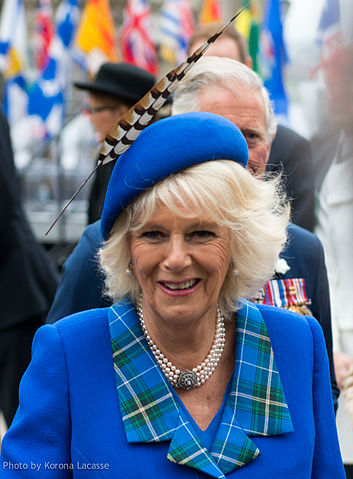
Early Life, Family and Education
Camilla Rosemary Shand was born in 1947, the eldest of three children of Major Bruce Shand (1917–2006) and the Honourable Rosalind Cubitt (1921–94), a philanthropist and daughter of the 3rd Baron Ashcombe. Camilla’s maternal great-grandmother, Alice Keppel, was a mistress of King Edward VII. Camilla’s great-great-great grandfather, Sir Allan Napier MacNab, was premier of the Province of Canada from 1854 to 1856.
Camilla attended Queen’s Gate School in South Kensington, London, and left at the age of 16. She subsequently attended a finishing school in Switzerland and studied French for six months at the Institut Britannique de Paris. Although Camilla described her French as “rusty” in 2013, she successfully delivered a speech in French that year at a charitable engagement in Paris.
First Marriage and Children
Camilla married Brigadier Andrew Parker Bowles (born 27 December 1939) in a Roman Catholic ceremony in 1973. The couple divorced in 1995. Andrew Parker Bowles’s parents were friends of Queen Elizabeth, the Queen Mother.
Camilla and Andrew have two children, Tom (born 18 December 1974) and Laura (born 1 January 1978), and five grandchildren. One of Laura’s children, Eliza Lopes, was a bridesmaid at the wedding of Prince William and Catherine Middleton in 2011.
Relationship with the Prince of Wales
Camilla was introduced to Charles by a mutual friend, Lucia Santa Cruz, in 1970. The couple frequently met at polo matches, where Camilla reputedly mentioned that her great-grandmother, Alice Keppel, had been involved with his great-great grandfather, King Edward VII. The relationship lasted until 1973, when Charles departed on an eight-month tour of duty with the Royal Navy and Camilla married Andrew Parker Bowles. Charles married Lady Diana Spencer in 1981.
Charles and Camilla resumed their relationship in 1986. Charles stated in a 1994 television documentary that his marriage had “irretrievably broken down” by that time. Diana blamed Camilla for the breakdown of her marriage, stating in a 1995 BBC Panorama interview, “There were three of us in this marriage, so it was a bit crowded.” Charles and Diana divorced in 1996, and Diana died in a car accident in 1997.
Charles and Camilla made their first public appearance together in 1999 at a 50th birthday party for Camilla’s sister, Annabel. The couple announced their engagement on 10 February 2005, which included a statement from Charles’s sons, Prince William and Prince Harry: “We are both very happy for our father and Camilla, and we wish them all the luck in the future.”
Duchess of Cornwall
On 9 April 2005, Charles and Camilla were married in a civil ceremony at Windsor Guildhall, followed by a Service of Prayer and Dedication at St. George’s Chapel at Windsor Castle. Charles and Camilla reportedly chose a civil ceremony out of respect for Charles’s future position as Supreme Governor of the Church of England. (In 2002, the Church of England declared that divorced persons could be married in the church but only in exceptional circumstances and at the discretion of individual clergy.) The Service of Prayer and Dedication was televised around the world, and attendees included Governor General of Canada Adrienne Clarkson and her husband, John Ralston Saul. As the wife of the Prince of Wales, Camilla technically became Princess of Wales, but that title remains closely associated with Diana, so Camilla used the title of Duchess of Cornwall, as Charles was also Duke of Cornwall before he became King.
Public Engagements and Philanthropy
Camilla is president, patron or honorary member of more than 120 charitable organizations. Her philanthropic interests include health, literacy, empowering women (including support for survivors of sexual assault and domestic violence), food, animal welfare, the arts, heritage buildings and active older age for senior citizens. In 2016, her philanthropy expanded when she assumed a number of the Queen’s patronages. Camilla also holds eight honorary military appointments, including colonel-in-chief of The Queen’s Own Rifles of Canada. In 2020, she became colonel-in-chief of The Rifles, a British Army regiment, taking over that role from Prince Philip. Camilla frequently accompanies Charles on Commonwealth tours and public engagements in the United Kingdom and around the world. As Queen Elizabeth and Prince Philip reduced their public engagements (Philip retired from such duties in 2017 and died in 2021; the Queen died in 2022), Charles and Camilla assumed a greater public role.

Canadian Tours
Camilla visited Canada for the first time in November 2009 and toured the provinces of Newfoundland and Labrador, Quebec, Ontario and British Columbia with Charles. The tour included a visit to Dundurn Castle in Hamilton, which was built by Camilla’s ancestor, Sir Allan Napier MacNab. Camilla asked numerous questions about Dundurn Castle and her family’s history, and the visit prompted headlines like “Camilla explores her Canadian roots at Hamilton’s Dundurn Castle.” A crowd of 500 people gathered to see the royal couple, chanting “We want the Duchess!” which stood out in a tour that otherwise attracted separatist protestors in Montreal and comparatively little public interest elsewhere on the itinerary. In 2010, Camilla became the royal patron of Dundurn Castle.
In 2012, Charles and Camilla represented Queen Elizabeth II in Canada for the celebration of the Queen’s Diamond Jubilee over Victoria Day weekend, which also marks the Queen’s official birthday in Canada. The itinerary included Gagetown- Oromocto and Saint John, New Brunswick; Toronto, Ontario; and Regina, Saskatchewan. Camilla made her first speech in Canada during this tour and addressed The Queen’s Own Rifles in Toronto, stating, “As your proud Colonel-in-Chief, I feel deeply honoured to be standing here today at your home in Moss Park Armoury, following in the footsteps of the late Queen Mary and Princess Alexandra [Queen Elizabeth II’s cousin].”
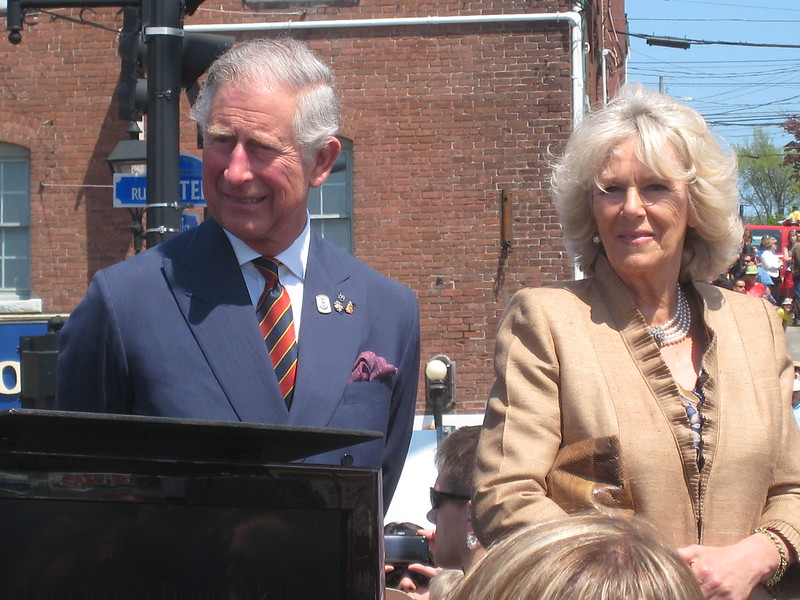
In 2014, Charles and Camilla toured Halifax and Pictou, Nova Scotia; Charlottetown, Prince Edward Island; and Winnipeg, Manitoba. Camilla undertook several solo engagements during this tour, visiting Alice House, an organization that supports women and children who are fleeing domestic abuse, in Dartmouth, Nova Scotia, and the Prince Edward Home long-term-care residence in Charlottetown.
In 2017, Charles and Camilla toured Iqaluit, Nunavut, Prince Edward County in Ontario, and the National Capital Region in honour of the 150th anniversary of Confederation and attended celebrations on Parliament Hill.
Platinum Jubilee Tour of Canada in 2022
Charles and Camilla toured Newfoundland, the National Capital Region, and the Northwest Territories from 17 May to 19 May 2022, in honour of Queen Elizabeth II’s Platinum Jubilee. The tour focused on several important themes, including the environment and engagement with Indigenous peoples. Camilla’s solo engagements during the tour reflected her philanthropic interests, particularly literacy and advocacy for survivors of domestic violence. In Ottawa, Camilla read to children at Assumption Elementary School and learned about efforts to encourage them to become avid readers. In Dettah, Camilla visited Kaw Tay Whee School to learn about Wıı̀lıı̀deh language education. (See also Yellowknives Dene.) In Yellowknife, she visited Lynn’s Place, YWCA-run transitional housing for women and children fleeing violence, to discuss services available to vulnerable women and children in the city.
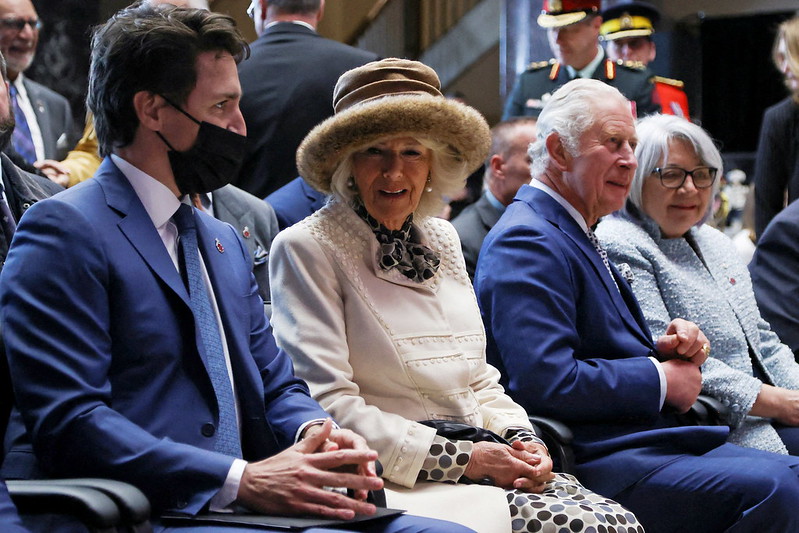
Queen Consort
On 6 February 2022, Queen Elizabeth II marked the 70th anniversary of her accession to the throne. The day before, the Queen released an Accession Day message that acknowledged messages of congratulation from the public on the Platinum Jubilee but also looked to the future of the monarchy. The Queen stated, “[w]hen, in the fullness of time, my son Charles becomes King, I know you will give him and his wife Camilla the same support that you have given me; and it is my sincere wish that, when that time comes, Camilla will be known as Queen Consort as she continues her own loyal service.” Charles and Camilla were “touched and honoured” by the Queen’s wish that Camilla be known as Queen Consort in the next reign. When the Queen died on 8 September 2022, Camilla officially became Queen Consort.
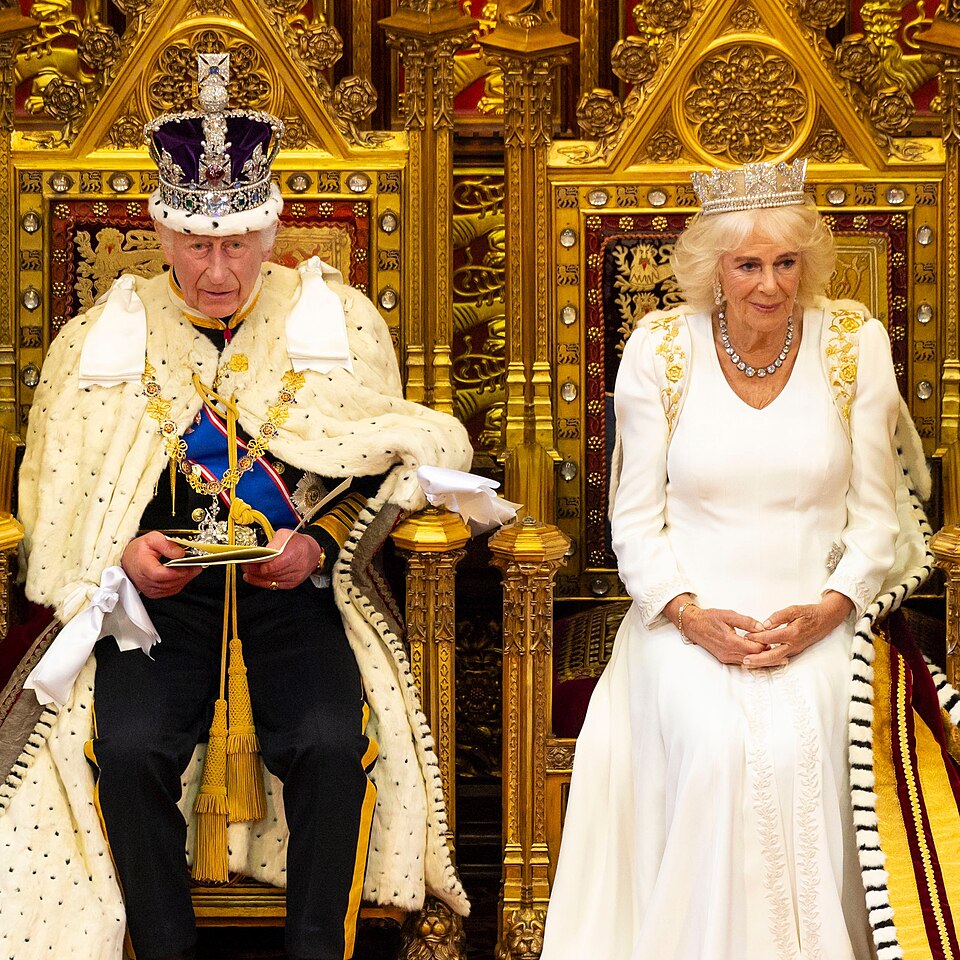
Coronation
Camilla was crowned on 6 May 2023, during the coronation of King Charles III and after the crowning of the monarch. The invitations to the ceremony invited guests to “The Coronation of Their Majesties King Charles III and Queen Camilla,” and there was much talk in the British press about the significance of omitting the word “consort” from her title, since consort specifically refers to the wife of the sovereign, while “queen” might refer to a reigning queen, a queen consort or a queen mother. There had not been a crowning and anointing of a queen consort since 1937, when Queen Elizabeth (later the Queen Mother) was crowned with King George VI. Camilla’s new role attracted considerable attention from the press and public in the United Kingdom and Commonwealth.
The coronation of King Charles III and Queen Camilla was attended by about 2,200 guests from around the world, including 850 community leaders and charity representatives and 450 recipients of the British Empire medal. The Canadian delegation included Prime Minister Justin Trudeau and his spouse, Sophie-Gregoire Trudeau, and Governor General Mary Simon and her spouse, Whit Fraser, as well as indigenous leaders, community leaders, young Canadians, and representatives of the Prince’s Trust Canada.
In Canada, there were official coronation celebrations in Ottawa, including a 21-gun salute on Parliament Hill. On 3 May 2023, Prime Minister Justin Trudeau announced that the Government of Canada plans to award 30,000 coronation medals to those who have made significant contributions to their community, region, province or country.
After the coronation, Ralph Goodale, the Canadian High Commissioner to the United Kingdom, stated that a royal visit to Canada could occur “within the course of the next several months.”
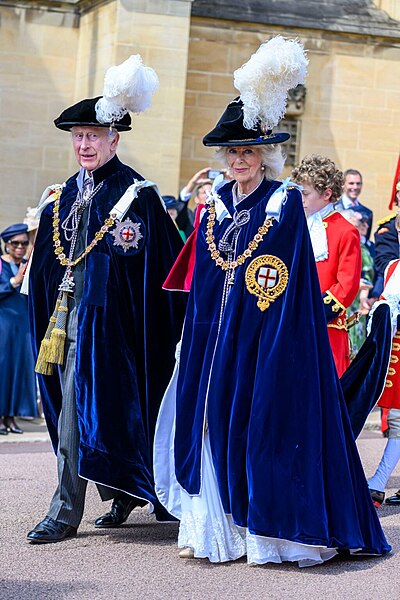
2025 Opening of Parliament in Canada
On 20 May 2025, King Charles III and Queen Camilla visited Canada House in London to commemorate the 100th anniversary of the High Commission of Canada in the United Kingdom. On 26 May, Queen Camilla accompanied the King to Ottawa, where they visited Lansdowne Park and planted a blue beech tree on the grounds of Rideau Hall. The following day, they attended the opening of Parliament in Ottawa, where the King delivered the Speech from the Throne. The Queen also placed a bouquet of flowers on the Tomb of the Unknown Soldier at the National War Memorial.
During the visit, Queen Camilla was sworn in as a member of the King’s Privy Council for Canada in the presence of Governor General Mary Simon and Canadian prime minister Mark Carney. This appointment followed a precedent for the royal consort set on 14 October 1957, when Prince Philip was appointed to the Queen’s Privy Council for Canada — the same day that Queen Elizabeth II became the first sovereign to open a session of Canada’s Parliament in person.
Did you know?
During her 2025 visit, Queen Camilla wore two different brooches from past royal tours of Canada. On 26 May, she wore the diamond maple leaf brooch, which King George VI presented to his consort, Queen Elizabeth, prior to the 1939 Royal Tour of Canada. Queen Elizabeth (later the Queen Mother), Queen Elizabeth II, Queen Camilla and Catherine, Princess of Wales, have all worn this brooch during royal tours of Canada. On 27 May, Queen Camilla wore The Queen’s Own Rifles of Canada brooch, a gift from the regiment where she is the colonel-in-chief. As the Duchess of Cornwall, Camilla wore this brooch when she delivered her first speech to The Queen’s Own Rifles of Canada in Toronto in 2012 and when she visited the Canadian Army Advanced Warfare Centre in 2017.

 Share on Facebook
Share on Facebook Share on X
Share on X Share by Email
Share by Email Share on Google Classroom
Share on Google Classroom

